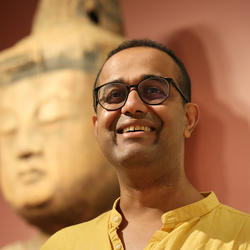Aditya Bhattacharjee

Aditya Bhattacharjee is an ethnographer of South and Southeast Asian religious traditions in both homeland and diasporic settings. His curiosity about Hindu divinities began with his grandmother’s bedtime stories, sparking a boyhood fascination that eventually grew into a full-blown academic pursuit. After earning his BA and MA at McGill University, he deepened his focus on transnational Hinduism during his doctoral research at the University of Pennsylvania, where he studied global worship communities dedicated to Ganesha, the elephant-headed deity. He also has a keen interest in the connections between Hinduism and Buddhism, particularly in pre-modern and modern Thailand.
Born in Bombay and raised in Bangkok, Aditya speaks Thai, Bengali, Tamil, Hindi and French, and he has studied Sanskrit and Pali at McGill, Penn and the American Institute of Indian Studies in Pune. In 2022, he garnered a Graduate Merit Award from the Canadian Federation for Humanities and Social Sciences for his fieldwork on newly constructed Ganesha temples in Thailand’s Chachoengsao province. He has presented at numerous forums, including the Council on Thai Studies (COTS), the Association for Asian Studies (AAS) and the American Academy of Religion (AAR).
At RISD, Aditya teaches courses on Buddhism, religion and diaspora, yogic traditions and the role of fantasy in world religions. He encourages students to explore how their art intersects with religious themes, a passion reflected in the many pieces of student artwork that decorate his living space.
Outside the classroom, Aditya can be found at home enjoying a spiced chai or at the gym, perfecting his bench press form.